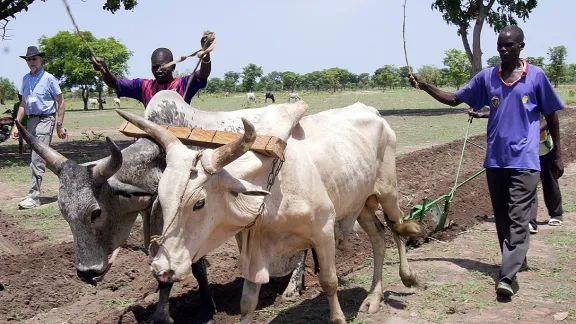
CAR refugees plow their field with the animals and plow provided by LWF in Southern Chad. Photo: LWF/C. Kästner
Animals, plows and vaccination campaigns
(LWI) – “It was about time the rain came,” Genio Maidoum says. Together with three younger brothers, the 16-year-old plows the family fields in Dosseye camp, southern Chad. They have one acre - the harvest is to complement the distributed food ration for a family of nine.
Genio is a refugee from the Central African Republic in Dosseye camp, Chad. His family is one of nearly 7,000 who have received two oxen, a yoke and a plow from The Lutheran World Federation (LWF) to help them farm the land which they have been allocated temporarily. As the rainy season has started in Chad, refugees in Dosseye camp have started planting.
“It will take two days to plow all our land,” Genio says. He is pushing the green plow into the soil, while two of his younger brothers lead the oxen. A third trails behind with a bowl full of beans. Every two steps he stretches out his arm and lets one of them fall into the freshly turned soil. “The cows are afraid of big people,” Genio says.
Harvest doubled
It is the second planting season they have mastered with a plow and animals, and Genio is full of praise. “Before, we just threw the seeds on top. Now we embed them into the soil, and our harvest has nearly doubled,” he says. “Last year, we harvested almost 18 bags full of grain. Normally we would have less than ten bags.”
Since the rain started a few days ago, plowing and planting can be seen everywhere in southern Chad. For most of the farmers it’s the second year they are working with what in technical terms is called an “Animal traction unit” – two cattle, yoke and plow to till the soil. “It’s not just about the harvest, it’s about the labour,” Adina Rudovil (28) says.
“Before, it would take me weeks to break the ground. I just had my hands and a hoe. Every evening I would come home utterly exhausted. Now – this is fun. Two days and the work is done.” He is accompanied by two children who are leading the cows. “They are the neighbor’s kids,” he says. “Whenever the children see someone working with the plow, they want to come and play with the cows.”
A few kilometers from where he works the land, cattle are led into a large corral. Together with the planting season, the LWF has started the first vaccination campaign of the year. Veterinarians and assistants in white lab coats with the LWF logo fill syringes and apply the shots to the animals which have been secured in a narrow cage.
Protect the children
“We vaccinate cattle, goats, dogs and poultry,” says Jaques Allatchi Saralam, LWF assistant for livestock projects. Up to four campaigns, depending on the animal, are carried out each year. While dogs receive four shots against rabies, LWF inoculates cattle two times a year against the most common pests. “It used to cost a lot of money and we had to walk a long distance,” Alasra Jean Oscar says. Since the LWF started their campaigns, it’s a short way for the CAR refugee to vaccinate the chicken, goats and cattle he has accumulated since he arrived in 2008.
It’s a necessary precaution, not only to build additional food sources and sustainability for the refugees. There are about 1,000 dogs in Gore. Refugees keep the animals for hunting and to protect their livestock. “People get bitten, even the masters, and sometimes also the children,” Alice Titina says. She still needs the dogs to protect her goats from thieves. “But now, even if they bite, people won’t get sick. It’s a relief.”


